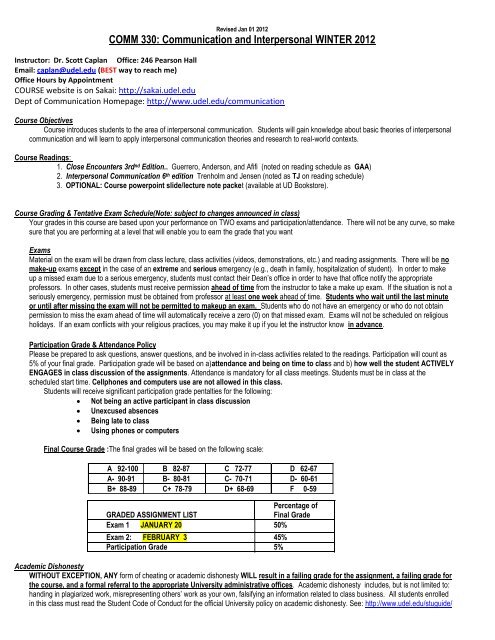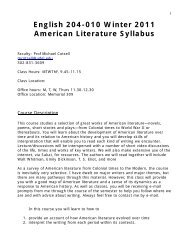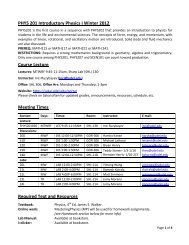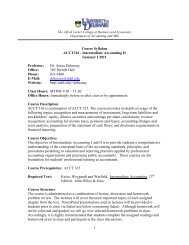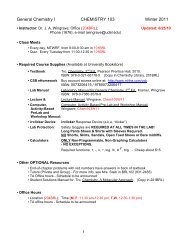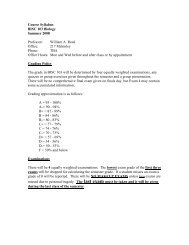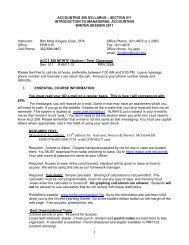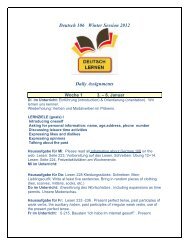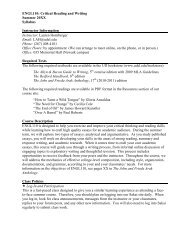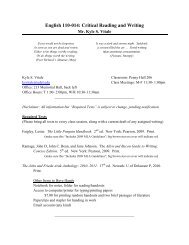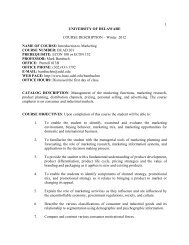COMM 330: Communication and Interpersonal Behavior â FALL 2003
COMM 330: Communication and Interpersonal Behavior â FALL 2003
COMM 330: Communication and Interpersonal Behavior â FALL 2003
You also want an ePaper? Increase the reach of your titles
YUMPU automatically turns print PDFs into web optimized ePapers that Google loves.
Revised Jan 01 2012<br />
<strong>COMM</strong> <strong>330</strong>: <strong>Communication</strong> <strong>and</strong> <strong>Interpersonal</strong> WINTER 2012<br />
Instructor: Dr. Scott Caplan Office: 246 Pearson Hall<br />
Email: caplan@udel.edu (BEST way to reach me)<br />
Office Hours by Appointment<br />
COURSE website is on Sakai: http://sakai.udel.edu<br />
Dept of <strong>Communication</strong> Homepage: http://www.udel.edu/communication<br />
Course Objectives<br />
Course introduces students to the area of interpersonal communication. Students will gain knowledge about basic theories of interpersonal<br />
communication <strong>and</strong> will learn to apply interpersonal communication theories <strong>and</strong> research to real-world contexts.<br />
Course Readings:<br />
1. Close Encounters 3rd nd Edition.. Guerrero, Anderson, <strong>and</strong> Afifi (noted on reading schedule as GAA)<br />
2. <strong>Interpersonal</strong> <strong>Communication</strong> 6 th edition Trenholm <strong>and</strong> Jensen (noted as TJ on reading schedule)<br />
3. OPTIONAL: Course powerpoint slide/lecture note packet (available at UD Bookstore).<br />
Course Grading & Tentative Exam Schedule(Note: subject to changes announced in class)<br />
Your grades in this course are based upon your performance on TWO exams <strong>and</strong> participation/attendance. There will not be any curve, so make<br />
sure that you are performing at a level that will enable you to earn the grade that you want<br />
Exams<br />
Material on the exam will be drawn from class lecture, class activities (videos, demonstrations, etc.) <strong>and</strong> reading assignments. There will be no<br />
make-up exams except in the case of an extreme <strong>and</strong> serious emergency (e.g., death in family, hospitalization of student). In order to make<br />
up a missed exam due to a serious emergency, students must contact their Dean’s office in order to have that office notify the appropriate<br />
professors. In other cases, students must receive permission ahead of time from the instructor to take a make up exam. If the situation is not a<br />
seriously emergency, permission must be obtained from professor at least one week ahead of time. Students who wait until the last minute<br />
or until after missing the exam will not be permitted to makeup an exam. Students who do not have an emergency or who do not obtain<br />
permission to miss the exam ahead of time will automatically receive a zero (0) on that missed exam. Exams will not be scheduled on religious<br />
holidays. If an exam conflicts with your religious practices, you may make it up if you let the instructor know in advance.<br />
Participation Grade & Attendance Policy<br />
Please be prepared to ask questions, answer questions, <strong>and</strong> be involved in in-class activities related to the readings. Participation will count as<br />
5% of your final grade. Participation grade will be based on a)attendance <strong>and</strong> being on time to class <strong>and</strong> b) how well the student ACTIVELY<br />
ENGAGES in class discussion of the assignments. Attendance is m<strong>and</strong>atory for all class meetings. Students must be in class at the<br />
scheduled start time. Cellphones <strong>and</strong> computers use are not allowed in this class.<br />
Students will receive significant participation grade pentalties for the following:<br />
Not being an active participant in class discussion<br />
Unexcused absences<br />
Being late to class<br />
Using phones or computers<br />
Final Course Grade :The final grades will be based on the following scale:<br />
A 92-100 B 82-87 C 72-77 D 62-67<br />
A- 90-91 B- 80-81 C- 70-71 D- 60-61<br />
B+ 88-89 C+ 78-79 D+ 68-69 F 0-59<br />
Percentage of<br />
GRADED ASSIGNMENT LIST<br />
Final Grade<br />
Exam 1 JANUARY 20 50%<br />
Exam 2: FEBRUARY 3 45%<br />
Participation Grade 5%<br />
Academic Dishonesty<br />
WITHOUT EXCEPTION, ANY form of cheating or academic dishonesty WILL result in a failing grade for the assignment, a failing grade for<br />
the course, <strong>and</strong> a formal referral to the appropriate University administrative offices. Academic dishonesty includes, but is not limited to:<br />
h<strong>and</strong>ing in plagiarized work, misrepresenting others’ work as your own, falsifying an information related to class business. All students enrolled<br />
in this class must read the Student Code of Conduct for the official University policy on academic dishonesty. See: http://www.udel.edu/stuguide/
WINTER 2011 Course Outline& Readings for Each Exam<br />
* This schedule is subject to change, I will announce any changes in class<br />
KEY: TJ = Trenholm & Jensen Text<br />
GAA= Guererro, Andersen & Afifi Text<br />
Topics & Readings for Exam 1<br />
1. Introduction: Basic Structures & Meaning Making<br />
TJ Ch 1 Intro<br />
GAA Ch1 Intro<br />
2. Verbal <strong>Communication</strong> & Language<br />
TJ CH 4 Verbal<br />
3. Intercultural <strong>Communication</strong><br />
TJ pp 373-377 Culture<br />
4. Codes: Nonverbal<br />
TJ Ch 3<br />
GAA: 129-130 “Nonverbal Affection”<br />
GAA 271-274 “Nonverbal Positions of Power<br />
5. Tools For Living: Deception<br />
GAA 315-319 (Deception)<br />
6. Self & Others: Identity & Self Presentation<br />
GAA: Chapter 2 (Identity/face/politeness)<br />
TJ: Chapter 7 (Role Competence)<br />
Topics & Readings for Exam 2<br />
7. Self & Others: Parent Child <strong>Communication</strong><br />
TJ Ch 5<br />
GAA 320-321 (Hurtful Messages)<br />
GAA 275=277 (Power <strong>and</strong> infuence in families.)<br />
8. Attachment Theory<br />
GAA pp. 166-177<br />
9. Uncertainty Reduction<br />
GAA pp. 75-89<br />
10. Attraction & Developing Intimacy<br />
GAA CH 3 (Attraction)<br />
GAA 104-115 (Initiating)<br />
12. Conflict & The End of Intimacy<br />
GAA 357-378<br />
GAA 346-351 (Conflict Patterns – Gottman’s Divorce Research)<br />
TJ 322-327(Ending Relationships)


